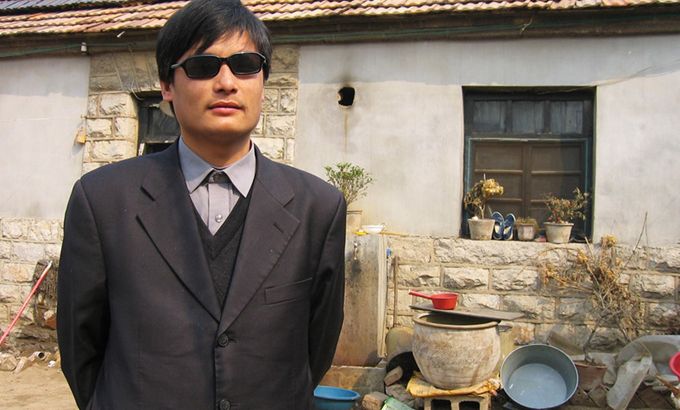
A US-China storm over Chen
We ask if the US buckled under Chinese pressure over human rights activist Chen Guangcheng.
Chen Guangcheng, the Chinese human rights activist who escaped house arrest to shelter in the US embassy in Beijing, has left American protection.
|
“In the midst of an election of course, this is a chance for Obama to look tough on foreign policy and act like a strong leader, against a country which is regarded as one of the bad guys …. Also we are in the midst of a cold war with China …. China has to be pictured as the bad guy as the Soviet Union was constantly and this is a good example of China looking like the bad guy.“ – Bill Blum, a historian and journalist |
So did the US buckle too easily under Chinese pressure?
Chen has long been an irritant for Chinese authorities as he campaigns to expose the harsh realities behind the country’s one-child policy.
His activism landed him a four-year jail term and even after his release in 2010 he was put under house arrest by local authorities.
But last week he escaped and sought protection at the US embassy in Beijing. He remained there for six days as the state department’s legal adviser and the assistant secretary of state for Asian and Pacific affairs negotiated with Chinese officials.
Finally, he was escorted to a nearby hospital.
The circumstances of his departure are a matter of controversy. The Associated Press news agency reported that US officials implied to Chen that his wife and children would not be safe if he did not leave the embassy. Not only that but Chen disputes key elements of the account given by US officials of his release, including that he said he wanted to kiss Hillary Clinton, the US secretary of state, upon his release.
US officials deny they relayed any threats to Chen but do acknowledge that he was told he would lose the chance to be reunited with his family if he did not leave.
The incident has overshadowed a trip to China by Clinton and other senior officials. They are in Beijing for talks on trade and foreign policy.
|
“What they [the US] want to do is get on [with] their most important strategic economic dialogue rather than focus on Chen Guangcheng, so they made the decision so hastily to throw him like [a] sheep to a pack of hungry wolves. America is trying to strike a balance between advancing human rights and US-China corporates in strategic areas. Of course, when they say ‘strike a balance’ they mean compromise on human rights. “ – Lianchao Han, the vice president of Initiatives for China |
China has demanded an apology from the US for its interference in Chinese domestic affairs via a press release from its foreign ministry.
It read, in part: “It must be pointed out that the United States embassy took the Chinese citizen Chen Guangcheng into the embassy in an irregular manner, and China expresses its strong dissatisfaction over this. The US handling of this was interference in Chinese domestic affairs, and this is totally unacceptable to China. The US embassy to China has a duty to abide by the relevant international and Chinese laws, and should not engage in activities that are not in keeping with its functions. China demands that the US apologise over this, thoroughly investigate this incident, punish those who are responsible, and give assurances that such incidents will not recur.”
When it comes to determining the number of prisoners of conscience in China, an exact figure is hard to come by. The non-profit group, Dui Hua, tracks jailed citizens in China.
Its most recent report says that 5,000 political and religious prisoners were being held at the end of 2011. The group also says there are more people detained in China for endangering state security than at any time since 1997. Charges of endangering state security are frequently used to curb free speech and association.
So how has the US handled this controversy and what role does a concern for human rights play in US foreign policy?
Inside Story: Americas, with presenter Shihab Rattansi, discusses with guests: Nancy Soderberg, a US diplomat; Bill Blum, a historian and journalist; and Lianchao Han, the vice president of Initiatives for China, a group that works to promote a transition to democracy in China.
|
“At no time did any US official speak to Chen about physical or legal threats to his wife and children. Nor did Chinese officials make any such threats to us. US interlocutors did make clear that if Chen elected to stay in the embassy, Chinese officials had indicated to us that his family would be returned to Shandong, and they would lose their opportunity to negotiate for reunification.” Part of the US State Department’s statement on Chen |
_________________________________________________________________________________________________
FACTS: CHEN GUANGCHENG
- Chen has been blind from childhood and is a self-trained lawyer
- He has worked to expose rights abuses linked to China’s one-child policy
- Chen had been under house arrest since 2010
- He spent four years in jail before he was put under house arrest
- Chen left the Beijing embassy hours after Clinton’s arrival
- China has demanded an apology from the US over the incident
- US officials had said China assured them of Chen’s safety
- Initial reports claimed that Chen did not want to leave China
- Al Jazeera was told: Chen fears for the safety of his family
- US officials said they would monitor Chen’s treatment
- Chen says Chinese officials have forced women to have late-term abortions